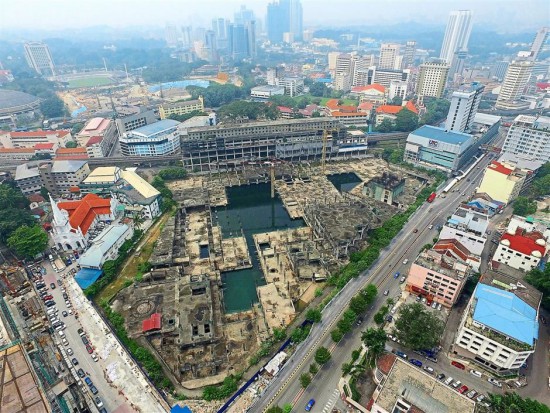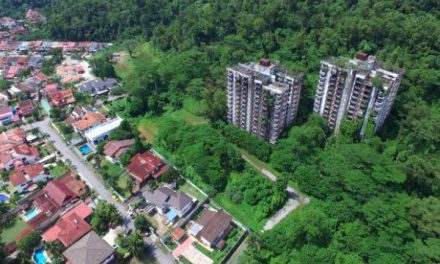Plaza Rakyat project to restart soon
Work on the long-abandoned Plaza Rakyat project in Jalan Pudu, Kuala Lumpur is expected to begin soon. A 43% stake in the developer – Profit Consortium Sdn Bhd – is being bought by China-based Guangzhou Xu Zhuo Enterprise Management Co Ltd, who are expected to pay the outstanding debt due to Kuala Lumpur City Hall (DBKL). The stake in Profit Consortium is being sold for RM2.4 million from Singapore-listed Debao Property Development Ltd Profit Consortium, which had problems in funding the project. Profit Consortium bought the partially completed Plaza Rakyat project in 2015. Comprising five parcels of leasehold land totalling 29.64 acres, it was purchased from DBKL for RM700 million, much of which remains unpaid. In 2017, the development plan for Plaza Rakyat had been finalised, and repair works to the existing development on the land had commenced, but work was halted due to cash flow difficulties to fund working capital requirements. The project is a large-scale mixed-use development that includes high-quality residential units, a five-star hotel, a budget hotel, offices and a large-scale shopping mall. (The Edge)
China-based developers roped in to build affordable homes using IBS method
China-based developers have been roped in to offer rent-to-own affordable homes that are built using Industrialised Building System (IBS), says Zuraida Kamaruddin. The Housing and Local Government Minister said Malaysia had last month inked deals with eight China-based companies to invest in Malaysia, transfer pre-fabrication construction technology, and offer rent-to-own option to buyers. She allayed fears that the China-based companies would pose a threat to local players. “At present, we only have 11 local companies involved in construction using IBS, and they only have the capacity to build 19,000 units annually. With IBS technology, we can lower the cost of construction in terms of lower cost of material, lower labour cost, and shorter timing (to complete construction),” she said, adding that it would also reduce dependence on foreign labour. (The Star Online)
Penang government in search of new landfill on island
Penang exco Jagdeep Singh Deo called on real estate stakeholders to seek for a new landfill site on the island, to reduce illegal dumping in the state. According to Jagdeep the numerous illegal dumping incidents which went viral on social media, have raised concerns among the real estate players. “We believe that the root cause of the illegal dumping activities is the high cost of transporting wastes to dumpsites on the mainland,” he said. The dumpsite at Jelutong has almost reached its capacity and would be closed to make way for a 40-hectare mixed development site. Jagdeep added that it was also proposed that the minimum penalty for illegal dumping be increased. (Malay Mail)
Developer gets stop-work order
A developer in Kampung Besar Berapit near Bukit Mertajam has been slapped with a stop-work order by the authorities after failing to mitigate soil erosion on the cliffs at its project site, about 600m from the Mengkuang Dam. The construction notice board says that the developer is building a three-storey birdhouse for swallows on the lot, with the plan approved in December 2016, but it is over two years since the approval with no sign of the birdhouse coming up. With the present rainy season, villagers living nearby are worried as the hill that was once covered in green is now a bald patch, exposing orange-coloured soil. Villagers living downstream fear that mud from the site would wash down to their homes if no mitigation is in place. The stop-work notice also requires the developer to submit a proposal for soil erosion mitigation and protection, as well as maintenance within seven days. (The Star Online)
Malaysia’s economy received RM84bil from tourists
Malaysia collected RM84.1 billion in overall tourism receipts last year, its highest ever while China tourists’ expenditure make up RM12.3 billion of the total. Chinese tourists who have been the key growth driver across southeast Asia for the past decade will continue to support Malaysian tourism growth, said research house Maybank Kim Eng. While there were higher tourism receipts collection, data from the Malaysian Tourism Board showed visitor arrivals to Malaysia had eased 3% in 2017 before easing another 0.4% in 2018 to 25.8 million. Analyst Wong Chew Hann said the lack of promotion over the past few months partly contributed to the decline. Wong suggested Malaysia should consider adopting e-visa for visitors from Singapore to counter the land checkpoints congestion issue. In anticipation of higher tourist arrivals from China, Asian governments are increasingly turning to integrated resorts for tax revenues, including Malaysia. (NST Online)





